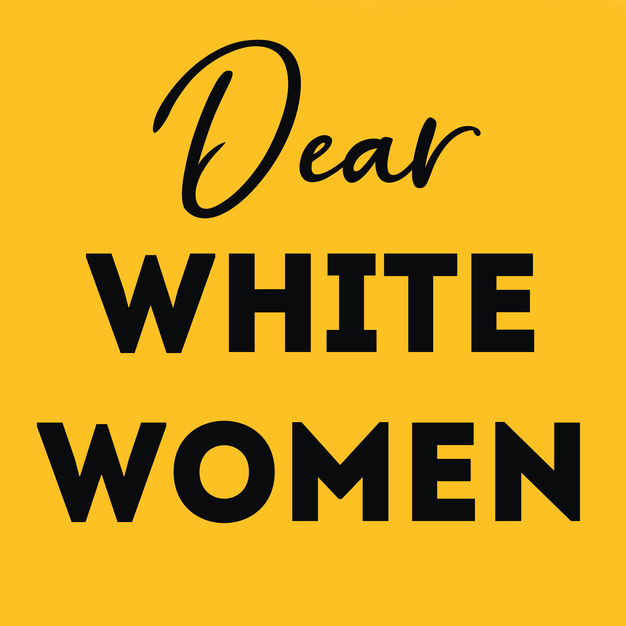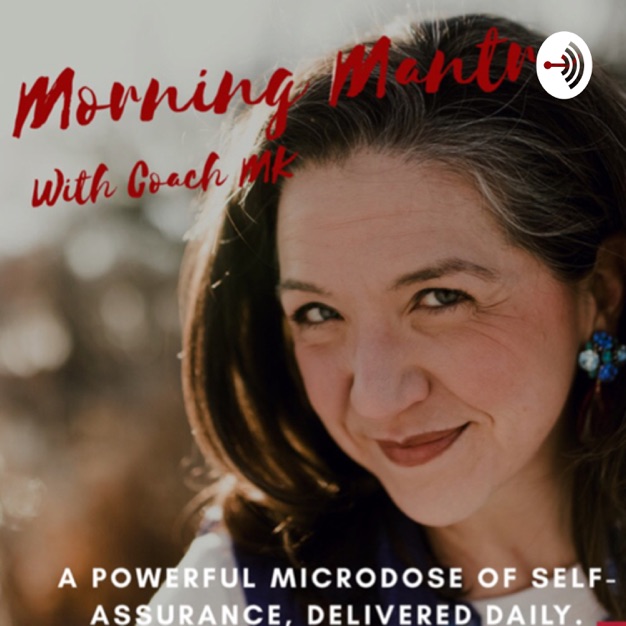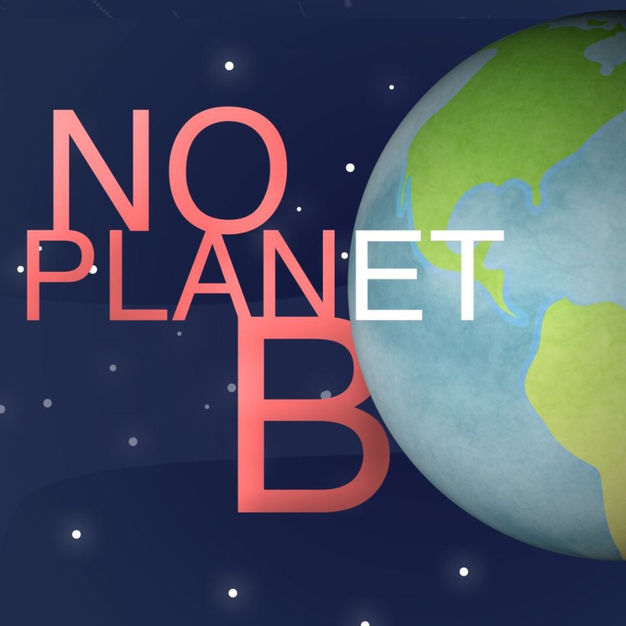
Dear White Women
Sara and Misasha
As women, we have the power of influence - whether through parenting, chatting in our social circles, voting, building and supporting consciously-run businesses, or simply listening to a different person's experience of the world.
- 30 minutes 39 seconds245: Why Trump Is Bad For [Y]OUR Well-being, Part I
In our last episode, we went through reasons - issue by issue (not all of them, but a lot of them) - about why our freedom and democracy are at risk if you vote for Trump and he gets elected for president again in 2024.
In brief, things like his stance on immigration and making America a white-supremacist-centered nation; Ukraine and what that says about his desire to pander to the influence of outside nations; his hatred of the press and what that indicates about his desire to turn America into an authoritarian state; abortion, and what this means for every woman, mother, and person capable of bearing a child, including the freedom of families overall. Notably, all through his own words because he’s been telling us what he’s going to do for years.
In today’s episode, we’re going inside (ourselves) to talk about wellness and thriving, and whether or not we value societies that make it possible for us to feel - and be - well. We’ll do this through the lens of a possible second Trump presidency, because we firmly believe that a second Trump presidency is bad for our well-being - mine and yours, both mentally and physically - and bad for us all, as human beings.
What to listen for?
-
The eight dimensions of wellness/wellbeing (in today’s episode, we talk about four of them - physical, intellectual, emotional, and social);
-
Trump’s policies that impact our physical well-being, including ACA and access to abortions;
-
How Trump’s disbelief in scientific fact and restrictions around schooling harm go directly against building intellectual well-being, especially for our future generations;
-
The emotional effects that we’re already feeling from a possible second term for Trump; and
-
How a Trump presidency could result in increased social isolation and divisiveness for our communities.
In case you missed it, here’s the link to our last episode on the risks to our freedom and democracy: https://www.dearwhitewomen.com/episodes/244-why-we-need-to-take-trump-at-his-word-dont-look-away
7 May 2024, 7:00 am -
- 38 minutes 52 seconds244: Why We Need to Take Trump At His Word (Don't Look Away)
You know that person you know - the one who exaggerates everything?
It’s kind of like that story of the blameless “boy who cried wolf” who lives in fantasy land and never takes responsibility for anything - and this person seemingly has not only the best life anyone could ever imagine, with loads of money, tons of friends, amazing vacations, but also, nothing ever seems to go wrong? (Instagram is a drug, friends).
Now imagine that friend is running (again) for President of the United States.
And that friend is bringing that energy into the race in the most destructive, divisive way possible, in which he’s only out for himself - which his statements prove every.single.day.
Those statements that you would roll your eyes at and dismiss? Now, you no longer can, because those statements tell you who he is, and exactly what he plans to do if he gets re-elected (spoiler alert: it’s going to be hugely destructive to our lives as we know them, and most, if not all, of our freedoms that we take for granted.).
You guessed it - we’re talking about Trump, and why we need to take him at his word. In other words, even though it’s painful - don’t look away.
He’s giving us the blueprint of how a Trump presidency would be, and not only is it worse than last time, it will destroy our democracy and our freedom along with it.
What to listen for?
-
Why we think the risk of having Trump in a second term is FAR more dangerous than having Biden.
-
Looking specifically at the harms that will befall our country because of things like his views on:
-
Immigration and making America a white-supremacist-centered nation,
-
Ukraine and what that says about his desire to pander to the influence of outside nations,
-
His hatred of the press and what that indicates about his desire to turn America into an authoritarian state,
-
Violence, and how a deeper threat of control and violence will eventually impact every American citizen
-
Abortion, and what this means for every woman, mother, and person capable of bearing a child, including families overall.
-
-
Do not look away from the massive threat Trump poses for our country.
Link to Trump’s Authoritarian Playbook 2025: https://www.authoritarianplaybook2025.org/
Resources:
To give us input on what you want from our newsletter, and/or share your Asian immigration stories, reach us via email at [email protected].
Follow Dear White Women so you don’t miss these conversations!
Like what you hear? Don’t miss another episode and subscribe!
Catch up on more commentary between episodes by following us on Facebook, Instagram, and Twitter – and even more opinions and resources if you join our email list.
23 April 2024, 7:00 am -
- 21 minutes 13 seconds243: High Five, Friends - Where We’ve Been and Where We’re Going
This week marks the FIVE-YEAR anniversary of the Dear White Women podcast! That means we’ve outlasted almost all the other podcasts out there… like ya knew we would.
From those first few episodes released altogether on April 15, 2019, to now… it’s been quite the ride. This year, in order to kick off year SIX (!!!) of the podcast, we thought we’d devote an entire shorter episode to talking about not only the past five years but what we have in store for the future and that shot of hope for all of us.
What to listen for:
-
How the podcast has evolved since its start in April 2019, including its history
-
The stand-out episode from this past year
-
Our personal whys behind doing this for the past five years and how that may have shifted over time
-
Where we think the Dear White Women platform goes from here
About Sara & Misasha:
A graduate of Harvard College and Columbia Law School, Misasha Suzuki Graham (she/her) has been a practicing litigator for over 15 years, and is passionate about diversity, equity, and inclusion in the legal profession as well as in her communities. She is a facilitator, writer, and speaker regarding issues of racial justice, especially regarding children, the
co-author of Dear White Women: Let’s Get (Un)comfortable Talking About Racism, and the co-host of Dear White Women, a social justice podcast. Misasha, who is biracial (Japanese and white), is married to a Black man and is the proud mom of two very active multiracial young boys. They live in the Bay Area of California with their largely indifferent cat.
Sara Blanchard (she/her) helps build community and connection through conscious conversations, which she does as a facilitator, TEDx speaker, writer, and consultant. After graduating from Harvard and working at Goldman Sachs, Sara pursued the science and techniques of well-being and is a certified life coach, author of two books (Flex Mom and DearWhite Women: Let’s Get (Un)Comfortable Talking About Racism), and co-host of Dear White Women, an award-winning weekly social justice podcast. Sara is biracial (Japanese and white), married to a white Canadian man, and is raising their two white-presenting girls to be compassionate, thoughtful advocates. They live in Denver, Colorado with their incredibly lovable dog.
To give us input on what you want from our newsletter, and/or share your Asian immigration stories, reach us via email at [email protected].
Follow Dear White Women so you don’t miss these conversations!
Like what you hear? Don’t miss another episode and subscribe!
Catch up on more commentary between episodes by following us on Facebook, Instagram, and Twitter – and even more opinions and resources if you join our email list.
Follow us on social media to continue the conversation!9 April 2024, 7:00 am -
- 32 minutes 51 seconds242: How to Have Compassionate Dialogue, with Dr. Nancy Dome
If you know us, you may know that we LOVE a good conversation - even if it’s uncomfortable or difficult. But this year, as we head into what seems to be ONLY conversations that are uncomfortable or difficult, how do we best do that? If the idea of even talking to someone now gives you pause, then this is the episode for you.
The connection quality of part of our conversation is a little iffy in places, but it’s worth listening to every moment of this episode. Our guest today (a repeat guest at that!) talks us through the journey of compassionate dialogue, including practical tips on how to practice this in your next conversation, and how to do the inner work necessary to make this the default, rather than the exception, to your conversations in 2024 and beyond.
What to listen for:
-
The compassionate dialogue structure includes the need to recognize, interrupt, and repair – and sometimes, we’re finding that recognizing our own emotions is the most challenging part!
-
The good/bad binary, and how it’s entirely unhelpful
-
A powerful example of how to have difficult conversations around politics
About Dr Dome:
Renowned speaker, author, and equity consultant Dr. Nancy Dome co-founded Epoch Education in 2014 to provide leaders in education and business with accessible professional development in diversity, inclusion and belonging, and equity. As an educator for nearly three decades, Dr. Dome taught in the juvenile court and community schools teaching our most vulnerable students, and has served as a Distinguished Teacher in Residence and faculty member at California State University San Marcos. Her transformative approach helps school districts and educational agencies throughout the country navigate complex topics, build bridges, and work together for inclusive, impactful change. She is the author of Let’s Talk About Race and Other Hard Things: A Framework for Having Conversations That Build Bridges, Strengthen Relationships, and Set Clear Boundaries and The Compassionate Dialogue Journey: A Workbook for Growth and Self-Discovery. For more information, visit www.epocheducation.com.
To hear Dr. Dome’s previous episode on Dear White Women, listen to Episode 164: https://www.dearwhitewomen.com/episodes/164-how-we-talk-about-race-and-other-hard-things
Resources:
To give us input on what you want from our newsletter, and/or share your Asian immigration stories, reach us via email at [email protected].
Follow Dear White Women so you don’t miss these conversations!
Like what you hear? Don’t miss another episode and subscribe!
Catch up on more commentary between episodes by following us on Facebook, Instagram, and Twitter – and even more opinions and resources if you join our email list.
Follow us on social media to continue the conversation!
26 March 2024, 7:00 am -
- 20 minutes 2 seconds241: Why Should We Care About “Being Political”?
“Oh, that’s so political.”
“We don’t talk about politics here.”
“Stop being so political.”
Have you heard that before, when someone brings up a topic that may have been mentioned in the news (or on social media)? Maybe you’ve even been the one that said it. But - have you ever heard it explained what exactly “political” means in this context? Or why shouldn't we talk about it?
We’d argue that there is no such thing as “political”. Or, conversely, perhaps EVERYTHING is political depending on who you are and how things affect you.
But regardless of why people feel things are too “political,” this is EXACTLY the year where we need to be doubling down on talking about all of those things, especially if you care about freedom - your own, in particular.
Even if you disagree with us, please listen in - maybe we’ll provide some food for thought. Or maybe our viewpoints are not so far apart after all.
What to listen for:
-
What people are really saying when they say, “stop being so political.”
-
Our freedom - military service, bodily autonomy, environment, and more - is at stake if we don’t get over our discomfort and start talking about the things that *really* matter.
-
The story of Little Johnny returns, to describe the parallel scenario of what’s happening with Trump and Putin.
To give us input on what you want from our newsletter, and/or share your Asian immigration stories, reach us via email at [email protected].
Follow Dear White Women so you don’t miss these conversations!
Like what you hear? Don’t miss another episode and subscribe!
Catch up on more commentary between episodes by following us on Facebook, Instagram, and Twitter – and even more opinions and resources if you join our email list.
12 March 2024, 7:00 am -
- 37 minutes 25 seconds240: Why Should We Care About Baseball? (Hint: It's About Civil Rights And Humanity)
If you’re listening to this episode around the time when it’s being released, then you’ll be listening to this right on the last day of Black History Month in the United States. It should go without saying that Black History is American History, but we’re going to say it anyway, and we’ll add that it shouldn’t be confined just to the shortest month of the year but instead should be taught to our kids every day of the year, and should be talked about by us as grownups by an equal amount.
This year, given where we are politically and nationally, we wanted to recognize another key day in February - February 19th. That’s the day when President Roosevelt signed Executive Order 9066, which forced 120,000 Japanese Americans (American citizens) to leave their homes and be relocated to concentration camps ON AMERICAN SOIL. They lost everything - their homes, their possessions, their businesses - but despite all of that, they fought to hold onto their dignity and as much of “normal life” as possible. Part of that normal life, for so many Japanese Americans, was the ultra-American pastime of baseball.
That’s exactly why we’re bringing you this episode today - an updated episode from last year where we talk about baseball, the Negro Leagues, and the history behind America’s favorite pastime - baseball - that you might not know, and probably weren’t taught in schools.
What to listen for:
-
The story of how baseball bridged a racial divide during WWII between white and Japanese children.
-
The separate (and decidedly not equal) conditions under which Black and white ballplayers had to play
-
Names of some Black superstar baseball players who – if/when integrated into the Hall of Fame – would be as good or better than some of the MLB athletes we celebrate today
-
How to talk with your kids, from kindergarten through high school, about this specific period of baseball in American history
Resources:
Episode 50, Why Aren’t Black Kids Playing Baseball?
Visit the Negro Leagues Baseball Museum
Society for AMerican Baseball Research – statistics
We Are The Ship: The Story of Negro League Baseball
Undeniable: Negro League Women
Undeniable: International Impact
To give us input on what you want from our newsletter, and/or share your Asian immigration stories, reach us via email at [email protected].
Follow Dear White Women so you don’t miss these conversations!
Like what you hear? Don’t miss another episode and subscribe!
Catch up on more commentary between episodes by following us on Facebook, Instagram, and Twitter – and even more opinions and resources if you join our email list.
27 February 2024, 8:00 am -
- 18 minutes 26 seconds239: Why Should We Care About Presidential Immunity?
In honor of Presidents’ Day coming up next week, we thought we’d focus on president…ial immunity. See what we did there?
With this episode, we’re kicking off a new “why should we care about…” series on DWW where we focus on the WHY behind important issues, so that we go into November making the most informed decisions we can about the candidates AND their platforms. We’re keeping these relevant, funny, and light - but also impactful in how to understand why we need to care about these issues.
So whether you (a) think you know everything you need to know about presidential immunity or (b) you don’t care or (c) who cares anyway because this is about Trump and he’s going to be the nominee anyway so what I think doesn’t even matter… or option (d), something else - this episode is a must listen. And then please share it with your friends.
What to listen for:
-
The accessible parallel through our fictional fourth grader, Johnny, to show you how presidential immunity might work.
-
The significance of the Fourteenth Amendment, and why it was written – the story of John B. Floyd, slave owner from Virginia who happened to be President James Buchanan’s secretary of war.
-
Truth bombs like: “If we have a president who is exempt from prosecution for crimes committed in office, then we have a dictator. We no longer have a president. So if you care about democracy, you need to care about presidential immunity.”
To give us input on what you want from our newsletter, and/or share your Asian immigration stories, reach us via email at [email protected].
Follow Dear White Women so you don’t miss these conversations!
Like what you hear? Don’t miss another episode and subscribe!
Catch up on more commentary between episodes by following us on Facebook, Instagram, and Twitter – and even more opinions and resources if you join our email list.
13 February 2024, 8:00 am -
- 30 minutes 10 seconds238: Of Greed and Glory: The Master-Slave Dynamic Pervades America
You know when you have a conversation that provides you with a framework of a problem – one you may not have even known existed – and it opens your eyes in a whole new way?
Yeah, today is one of those conversations.
Because it helps look at questions like this: Do we really know what freedom is? How about liberty? And if we don’t know what those concepts mean, how do we know if we’ve lost them? And what role does the carceral system have in all of this?
This might seem like a lot, but in a year in which we’re questioning everything - democracy and America, to name a few - if we don’t know what those concepts mean, how can we imagine a world full of them?
That’s one of the questions that today’s guest asks - and answers - through her new book, Of Greed and Glory, which takes a look at her brother’s incarceration in Angola and uses that as a jumping-off point to ask some larger questions that, in all honesty, we need to be asking ourselves if we really want to be engaged in this fight.
After you listen to this episode, please tell several friends about it, and look to support people doing this work in your community. As always, we’d love to hear what resonates with you - please do reach out and let us know.
What to listen for:
-
How incarcerating an individual is actually incarcerating a family
-
Does America even want to be a democracy anymore?
-
The master-slave dynamic – including how that shows up in patriarchy, and yes, why we believe women understand the significance of this conversation. Hello, Dear White Women podcast…
-
How American enterprises are built on the same model as the slave plantation slate. Corporate America, we’re looking at you.
-
What we can do to start changing the system
About the author:
DEBORAH G. PLANT is an African American and Africana Studies Independent Scholar, Writer, and Literary Critic specializing in the life and works of Zora Neale Hurston. She is the editor of the New York Times bestseller Barracoon: The Story of the Last “Black Cargo” by Zora Neale Hurston and the author of Alice Walker: A Woman for Our Times, a philosophical biography. She is also the editor of The Inside Light: New Critical Essays on Zora Neale Hurston, and the author of Zora Neale Hurston: A Biography of the Spirit and Every Tub Must Sit On Its Own Bottom: The Philosophy and Politics of Zora Neale Hurston. She holds MA and Ph. D. degrees in English from the University of Nebraska-Lincoln and traveled to Benin as a Fulbright-Hays fellow. Plant played an instrumental role in founding the University of South Florida’s Department of Africana Studies, where she chaired the department for five years. She presently resides in Florida.
To give us input on what you want from our newsletter, and/or share your Asian immigration stories, reach us via email at [email protected].
Follow Dear White Women so you don’t miss these conversations!
Like what you hear? Don’t miss another episode and subscribe!
Catch up on more commentary between episodes by following us on Facebook, Instagram, and Twitter – and even more opinions and resources if you join our email list.
30 January 2024, 8:00 am -
- 40 minutes 34 seconds237: Helping to Dismantle or Uproot Systemic Racism Does Not Always Have to Be Heavy
It can be as simple - and meaningful - as picking up a fiction novel, reading it, and discussing it with your book club. Because once you see, hear, and learn, we don’t think you’ll ever be able to “go back to how it used to be.” You’ll change. You’ll do things differently. You’ll make ripple effects happen. Change is not a one-size-fits-all phenomenon, nor is change-making. More often than not, it starts small, local, and with just one intentional action.
Today we bring you just that book that we recommend you read with your book club in 2024. The fabulous co-authors of Rebecca Not Becky, Christine Platt, and Catherine Wigginton Green, drew on both their lived experiences and their work as DEI advocates to bring you all a relatable story that will impact the way you see the world, no matter who you are!
What to listen for:
-
Why this book is different - written by DEI practitioners from a Black and white perspective
-
What the authors found most challenging and surprising about writing the book
-
The unexpected feedback the authors are receiving so far
-
How helpful it is to write and post real, positive reviews on works like this
About the authors: Both live in Washington, DC.
CHRISTINE PLATT writes literature for children and adults that centers on African diasporic experiences—past, present, and future. She holds Bachelor and Master of Arts degrees in African and African American studies as well as a Juris doctorate in general law. She currently serves as Executive Director for Baldwin For The Arts.
CATHERINE WIGGINTON GREENE is a writer and filmmaker whose storytelling focuses on strengthening human connection and understanding. Her feature documentary “I’m Not Racist . . . Am I?” continues to be used throughout the US as a teaching tool for starting racial dialogue. A graduate of Coe College and Columbia University’s Graduate School of Journalism, Catherine is currently pursuing her doctorate from The George Washington University’s Graduate School of Education and Human Development.
To give us input on what you want from our newsletter, and/or share your Asian immigration stories, reach us via email at [email protected].
Follow Dear White Women so you don’t miss these conversations!
Like what you hear? Don’t miss another episode and subscribe!
Catch up on more commentary between episodes by following us on Facebook, Instagram, and Twitter – and even more opinions and resources if you join our email list.
16 January 2024, 8:00 am -
- 32 minutes 7 seconds236: DEAR WHITE WOMEN – Happy New Year 2024
Akemashite Omedetou Gozaimasu! Happy New Year!
We like to split this episode, one we have done every year at this time of year for the last four years, into two parts – reflections and projections. You’ll want to listen so you don’t miss how to stay involved in what’s next for us, the podcast, and 2024 as a whole.
What to listen for:
-
Our history, identities, and what we’ve learned in 2023, including huge successes through the year
-
How to submit ideas for episode topics in 2024 & book us for speaking gigs: contact us at [email protected]
-
Stats around how Trump is looking increasingly like a dictator and how we must be vigilant in our own communities and have conversations to further our shared democratic goals
About us:
A graduate of Harvard College and Columbia Law School, Misasha Suzuki Graham (she/her) has been a practicing litigator for over 15 years, and is passionate about diversity, equity, and inclusion in the legal profession as well as in her communities. She is a facilitator, writer, and speaker regarding issues of racial justice, especially regarding children, the co-author of Dear White Women: Let’s Get (Un)comfortable Talking About Racism, and the co-host of Dear White Women, a social justice podcast. Misasha, who is biracial (Japanese and White), is married to a Black man and is the proud mom of two very active multiracial young boys. They live in the Bay Area of California with their largely indifferent cat.
Sara Blanchard (she/her) helps build community and connection through conscious conversations, which she does as a facilitator, TEDx speaker, writer, and consultant. After graduating from Harvard and working at Goldman Sachs, Sara pursued the science and techniques of well-being and is a certified life coach, author of two books (Flex Mom and Dear White Women: Let’s Get (Un)comfortable Talking About Racism), and co-host of Dear White Women, an award-winning weekly social justice podcast. Sara is biracial (Japanese and White), married to a White Canadian man, and is raising their two White-presenting girls to be compassionate, thoughtful advocates. They live in Denver, Colorado with their incredibly lovable dog.
2 January 2024, 8:00 am -
- 54 minutes 18 seconds235: It’s Not Race, It’s Racism: Raising Multi-Ethnic Families, with Naomi Raquel Enright
One of the things that we find most rewarding about our own journeys in anti-racism, racial justice, and social justice is when we come across practitioners who come from a similar framework that we do (heart-centered, humanity first, believe people when they tell you their stories, and all of those things) but also challenge us to think more broadly, or more deeply, about these topics in powerful ways. Our guest today does all of that and more.
Naomi Raquel Enright is a DEI practitioner, Ecuadorian and Jewish, a mother, sister, daughter, and so many more things - and all of these identities influence how she views the world, especially when she thinks about raising her son. It was an honor to be able to talk about raising multiethnic children with her today, especially with her clear focus on the systems that keep us trapped in a narrative about race that helps zero people in the end. We hope that you sit with what she says, and think about how you frame your understanding of families, systems, and individuals as a result.
What to listen for:
-
How being raised as the daughter of an Ecuadorian mother and white father shaped Naomi’s perspectives in raising her son
-
What to think about when assuming things about other families – in particular, whether someone is or isn’t a certain child’s mother – and what that felt like to be on the receiving end of
-
The reasoning behind some new-to-us phrasing – “presumed to be white” instead of “white-presenting” or “passing for white” and “multi-ethnic” instead of “multiracial/biracial”
-
Some thoughts on raising children the world presumes to be white, and what white families can do better
About Naomi:
Naomi Raquel Enright is a writer, educator, and consultant based in Brooklyn, NY. She is also a National SEED (Seeking Educational Equity and Diversity) Facilitator and a New York Appleseed board member. Raised in New York City, she was born in La Paz, Bolivia to an Ecuadorian mother and a Jewish-American father, and is a native speaker of English and Spanish. She holds a BA in Anthropology from Kenyon College and studied at the Universidad de Sevilla, Spain. She writes about racism and identity, loss, and parenting. Her essays have appeared in several publications including Hold The Line Magazine, Family Story, Role Reboot, Streetlight Magazine, among others, and in the anthologies, The Beiging of America (2017), Sharing Gratitude (2019) and Streetlight Magazine 2021 (2022). She has been interviewed on a number of podcasts, including Global Citizenship & Equity, Inclusion School, War Stories from the Womb, The Mixed Creator, and Project 25. Her essay The Hidden Curriculum, received an Honorable Mention in Streetlight Magazine’s 2021 Essay/Memoir Contest. Her book, Strength of Soul (2Leaf Press; University of Chicago Press), was published in April 2019.
Read Naomi’s written work:
19 December 2023, 8:00 am -
- More Episodes? Get the App
Your feedback is valuable to us. Should you encounter any bugs, glitches, lack of functionality or other problems, please email us on [email protected] or join Moon.FM Telegram Group where you can talk directly to the dev team who are happy to answer any queries.
 Morning Mantra
Morning Mantra
 TILclimate
TILclimate
 No Planet B
No Planet B
 The FitMind Podcast: Mental Fitness, Neuroscience & Psychology
The FitMind Podcast: Mental Fitness, Neuroscience & Psychology
 Fitness Protection: The Podcast | Running Life
Fitness Protection: The Podcast | Running Life